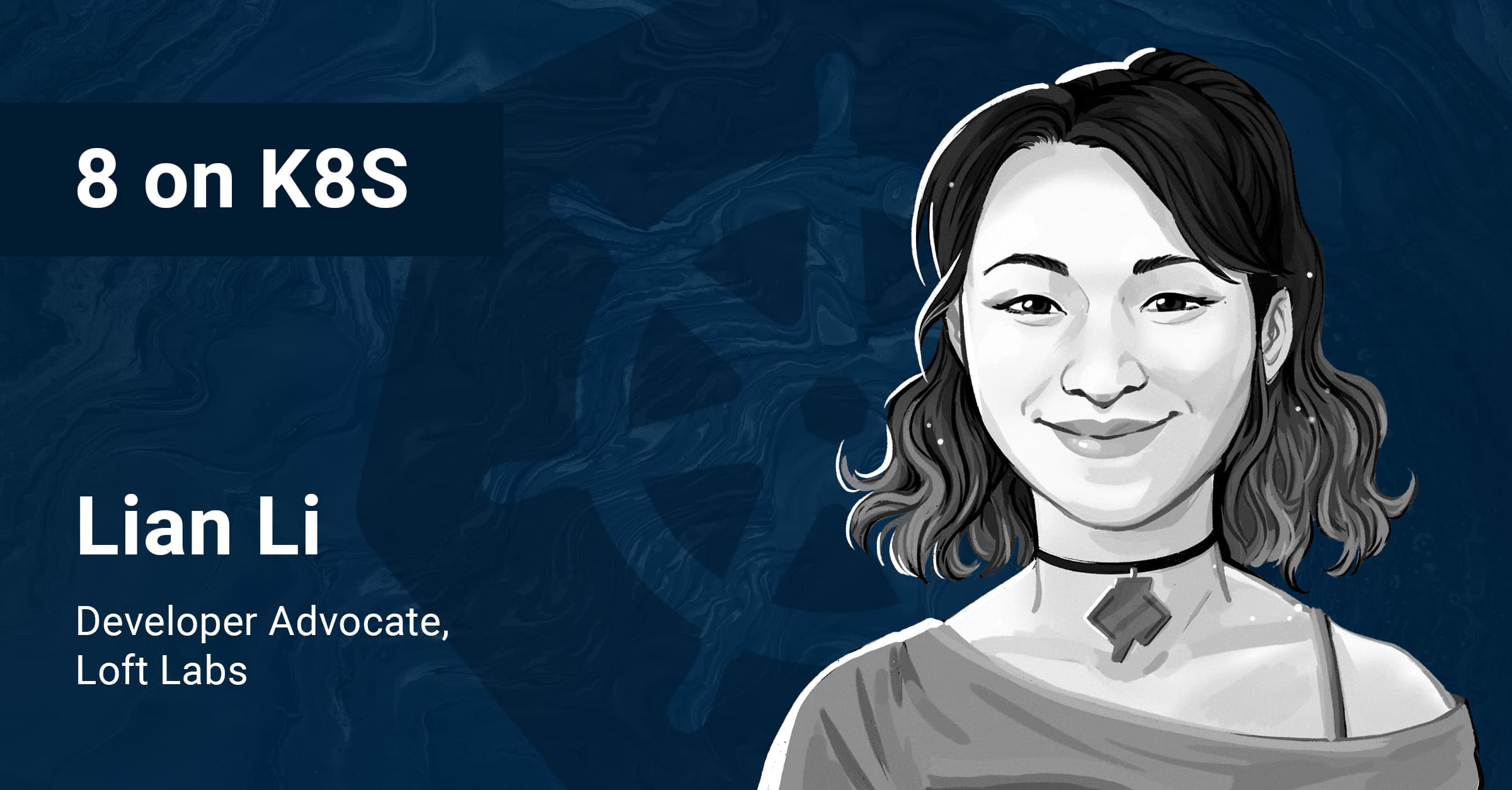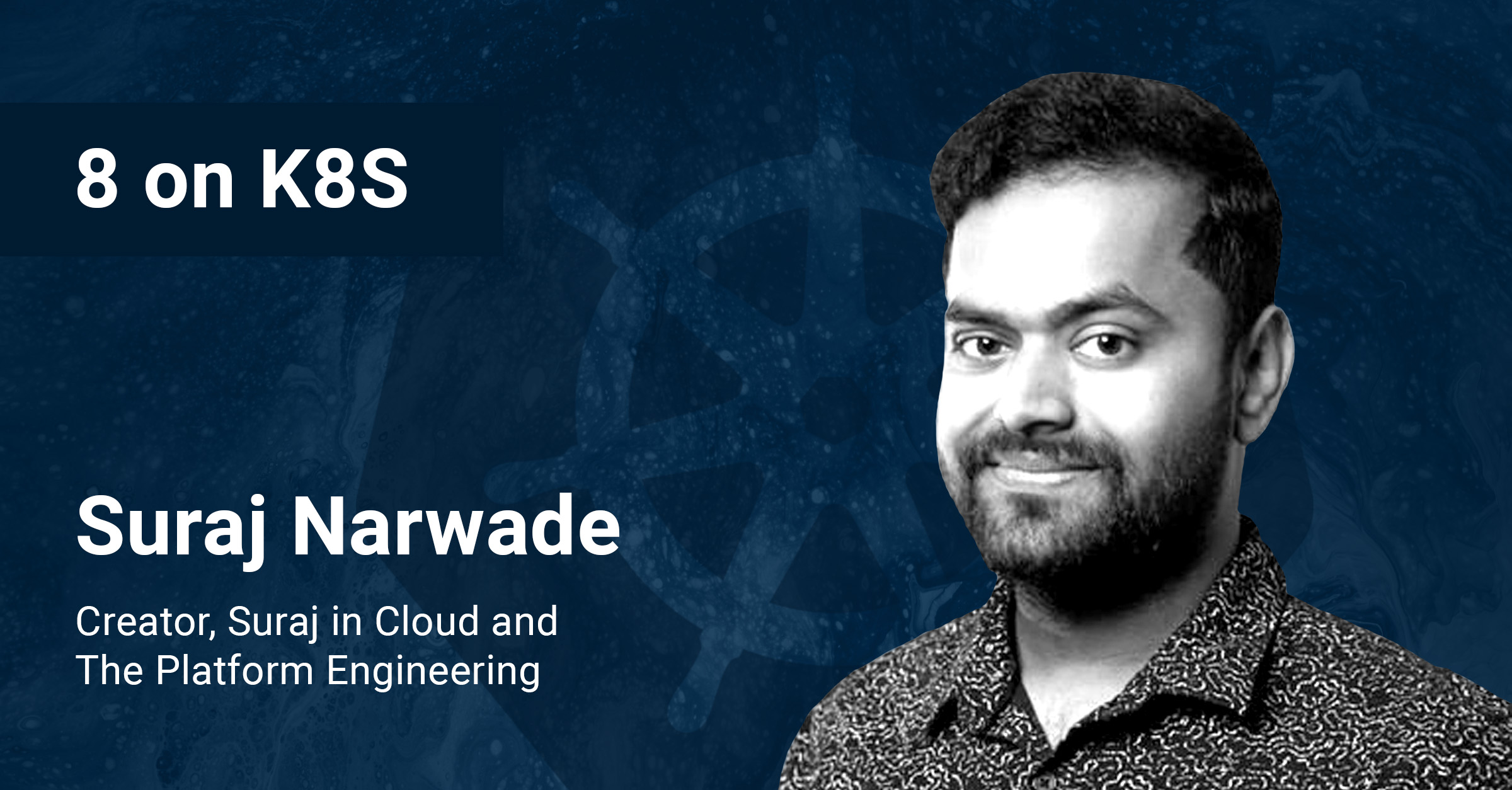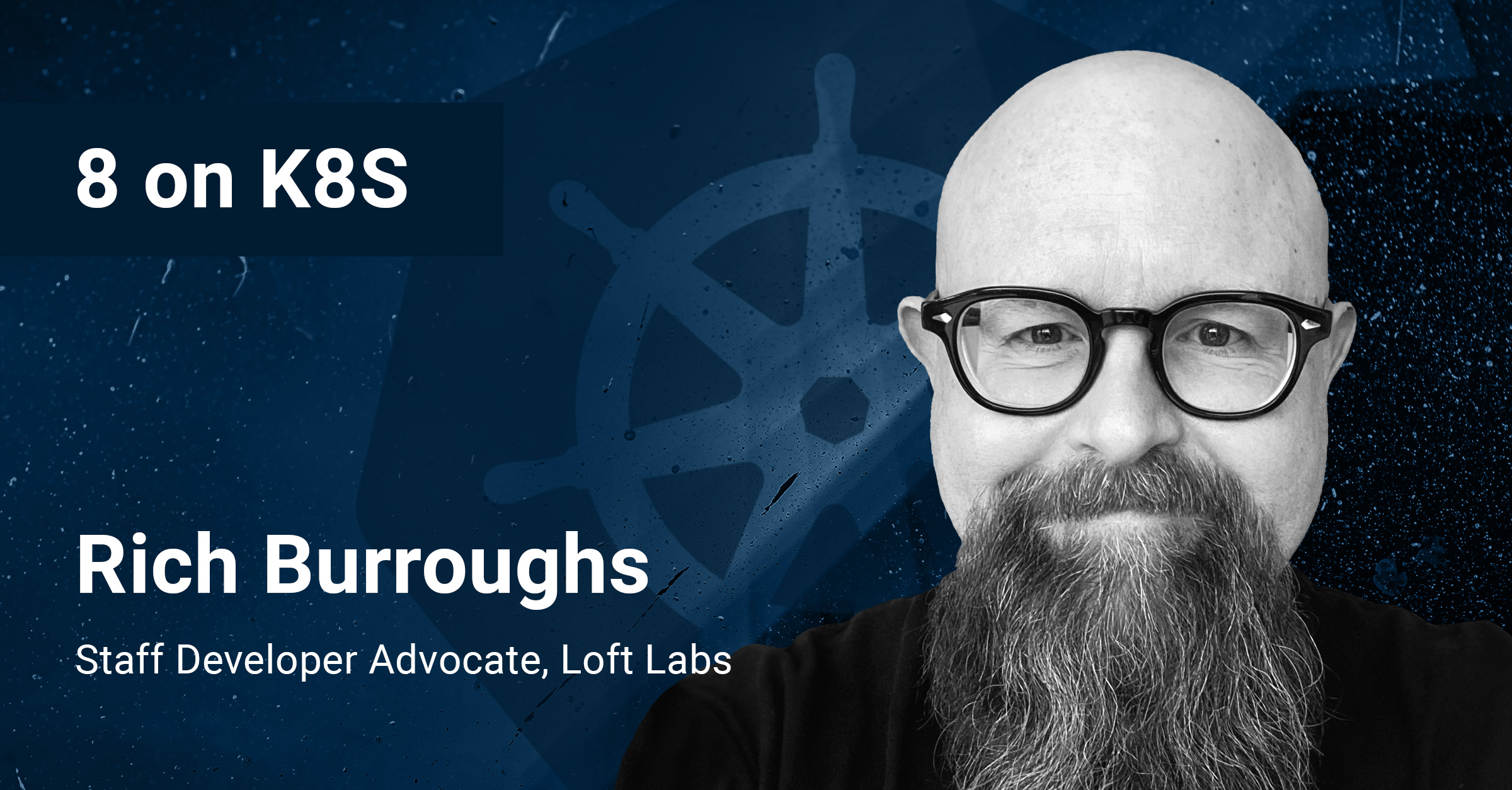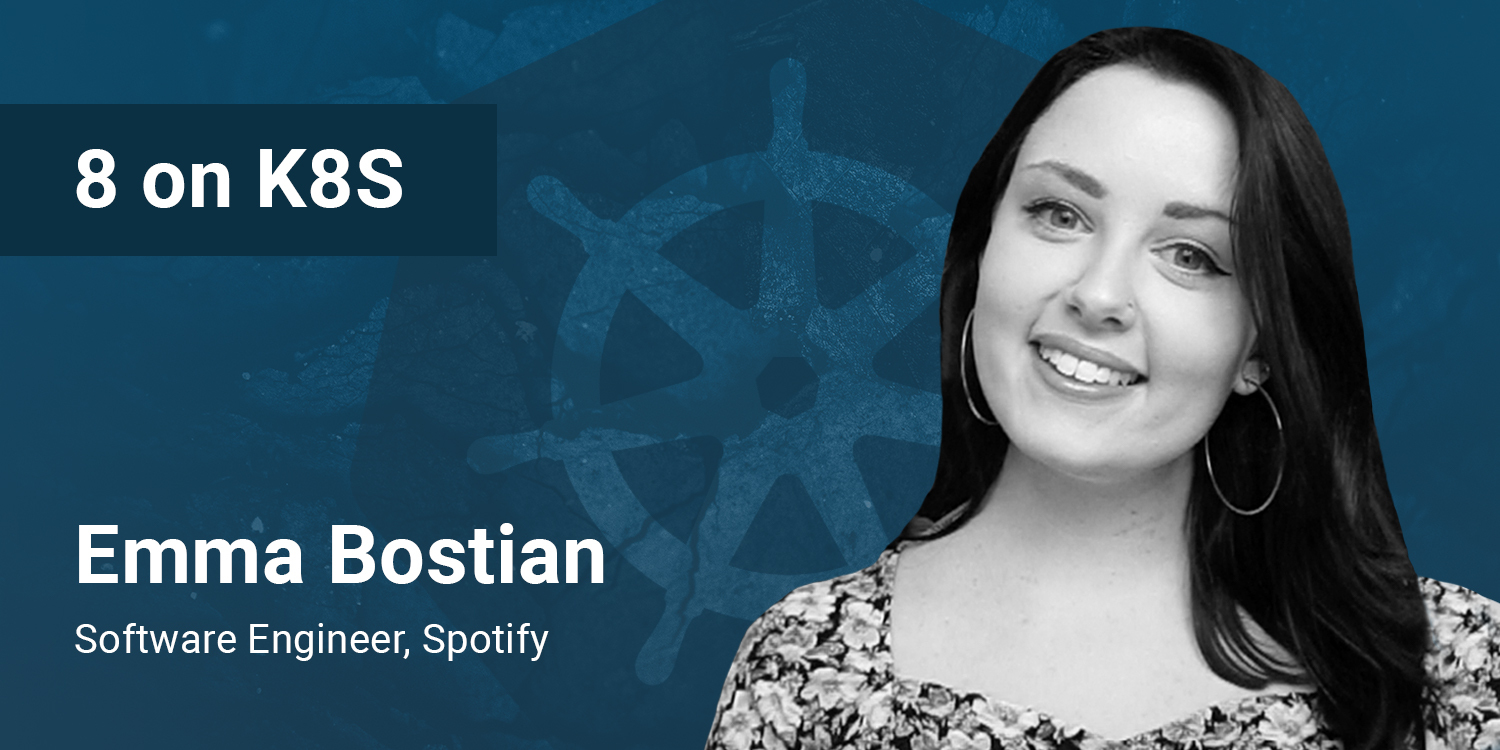8 on K8s with Lian Li
by The Team @ Giant Swarm on Aug 8, 2023

Welcome to our series 8 on K8s where we interview interesting people in the Kubernetes community. In fact, check out our previous one with Suraj Narwade. If you’d like to be featured or know someone who’d be a great fit, tweet us and spread the love.
Lian always wanted to save the world. After attempting to become a lawyer, she decided to do something with computers instead. Working as a Fullstack Software Engineer, she got into attending tech events and giving talks on Machine Learning. During this time, she fell in love with the tech community and discovered her passion for building community and providing a safe and productive environment for all, which led to her co-organising the community conference ServerlessDays Amsterdam and DevOpsDays Amsterdam. Currently, Lian lives in Amsterdam and works as Developer Advocate at Loft Labs, helping to make developing on Kubernetes easy and fun. She also started Kuberoke, the first and only Kubernetes Karaoke Community.
What’s the last book you read?
Recently, I came across a fascinating book called No Rules Rules. It delves into the unique culture at Netflix, where they promote a high-achiever environment with a lot of autonomy, but also hold individuals responsible for their actions. It's a captivating insight into how they handle certain rules, and I found it particularly interesting because I have friends who work at Netflix, and they confirmed its accuracy. Additionally, I enjoy science fiction novels, and the last one I read was from the Murderbot series. Those books are just a delightful balance of humor and intrigue.
What problem are you trying to solve?
My main focus is on making technology more accessible, especially in the realm of developer tooling and enabling developers. I want to cater to both the technically inclined and those who may not have an in-depth technical background. My goal is to create products and resources, including documentation and learning materials, that provide a solid starting point for everyone. Whether someone is deeply interested in diving into a topic or just wants to use a tool without much hassle, I want to make the experience smooth and empowering for all.
What’s an interesting trend you’ve observed in our industry?
I do have a bit of a hot take in our industry, so let me start with the more moderate observation first. When it comes to DevOps, I've noticed a growing trend towards productizing solutions. Instead of just building infrastructure and leaving developers to their devices, we're starting to realize that the true essence of DevOps lies in bridging the gap between dev and ops teams. We want to bring them closer together and provide services or products that cater to developers' needs, making their lives easier and more productive. It's a friendly take on how we're evolving our approach to DevOps.
Now, onto the hotter take. I've observed a concerning marketing buzzwordization in the tech industry, and it's not just limited to DevOps. We're all aware of the hype cycles that keep circulating in tech, and we can't help but become victims of them to some extent. The issue arises when companies focus more on their flashy marketing messages than delivering real value. Some organizations hype up their products, making them seem incredibly valuable, but in reality, they might not live up to the claims.
This can be quite confusing, especially for newcomers who are trying to navigate the tech landscape. The use of ambiguous words like service, API, certificate, and the current obsession with platforms can be overwhelming and misleading. I've witnessed people getting caught up in the hype cycle, adopting technologies like Kubernetes without deeply understanding their actual needs.
As a consultant, I've seen the consequences of this trend, where people end up with solutions they don't really comprehend or need. They're presented with pre-packaged solutions, leading to more significant problems down the line because they never fully engaged with the root of their issues.
In general, our attention spans have become shortened, partly due to the fast-paced news cycles and social media. We're bombarded with so much information that we don't deeply engage with specific topics. While some may want to get mad on Twitter every day, that’s fine, I don’t.
What’s the last thing you read about our industry that got you really fired up?
Recently, I came across a discussion about developer advocacy and the qualifications needed for such a role. Some individuals tend to gatekeep and set arbitrary standards, implying that only those with specific backgrounds can be successful advocates. I firmly believe that empathy, understanding developers' pain points, and a genuine interest in technology are essential qualities for developer advocates. It's crucial to welcome diverse perspectives and not dismiss individuals based on preconceived notions. We need more inclusivity in tech, and gatekeeping is a counterproductive practice that hinders progress.
What do you do that helps you maintain balance in your life?
Maintaining balance in life is crucial for me, and I achieve it through various creative outlets. I like singing and dancing, and I even hold the title of Chief Karaoke Officer. Engaging in stage performances and improv courses has helped me step out of my head and be present in the moment. I also enjoy doing some DIY projects, like sewing clothing, as it allows me to focus on tangible tasks and disconnect from the virtual world because working on the computer can be a bit dry. Outdoor activities like hiking are also great for clearing my mind and bringing a sense of lightness to my thoughts.
What’s the biggest risk you’ve ever taken?
Moving to the Netherlands five years ago was a significant risk, even though I already had a job lined up. But beyond that, I tend to push myself into new areas, exploring different domains within the tech industry. From web development to machine learning and AI, I've ventured into various fields without confining myself to a specific technology or role. I believe in focusing on problem-solving and minimizing technological dependencies. Moreover, I don't shy away from standing up for my beliefs, even if it means confronting conflicts and speaking my truth.
Who do you look up to in the industry?
Rather than singling out specific individuals, I find inspiration in acts of resilience and determination, especially from those who have faced adversity. Women in tech who have attained senior positions despite the challenges of breaking through gender norms are among those I admire. However, it's the actions that people take that truly impress me, such as the work done by Kim Crayton, an antiracist economist, who actively works towards improving diversity, equality, and inclusion in the tech industry. Her relentless pursuit of empowering marginalized individuals through workshops and programs is something I deeply respect.
Can you hold two contradictory thoughts in your mind simultaneously without feeling uncomfortable?
100 percent. In the book The Outer Limits of Reason, I learned that our language and logic have limitations, making it possible to have conflicting beliefs that both feel true.
For instance, when it comes to open source and community work, I genuinely believe that everyone is doing their best, yet I also acknowledge that we can always strive to do better. This might seem mathematically contradictory, but it reflects the complexity of human behavior and the constant room for improvement.
In my talk on diversity and inclusion, I emphasize that people are multifaceted and can hold contradictory thoughts without inconsistency. Believing that everyone has goodness within them doesn't mean everything we do is perfect or always aligned with that belief. It's essential to embrace the complexities of human nature.
In the tech industry, we could benefit from individuals who possess strong communication and empathy skills, traits that are often overlooked in favor of technical expertise. I, for one, prioritize considering power dynamics and potential harm in communities. Ensuring the safety and well-being of individuals is a paramount goal, even more critical than merely providing the right learning resources.
To create a productive and effective environment, we must understand the nuances of human behavior and how communities can impact individuals positively or negatively. Only by acknowledging these complexities can we foster a more inclusive and supportive tech industry.
You May Also Like
These Related Stories

8 on K8s with Suraj Narwade
Welcome to our series 8 on K8s where we interview interesting people in the Kubernetes community. In fact, check out our previous one with Rich Burrou …

8 on K8s with Rich Burroughs
Welcome to our series 8 on K8s where we interview interesting people in the Kubernetes community. In fact, check out our previous one with Álvaro Agea …

8 on K8s with Emma Bostian
Welcome to our series 8 on K8s where we interview interesting people in the Kubernetes community. In fact, check out our previous one with former prof …